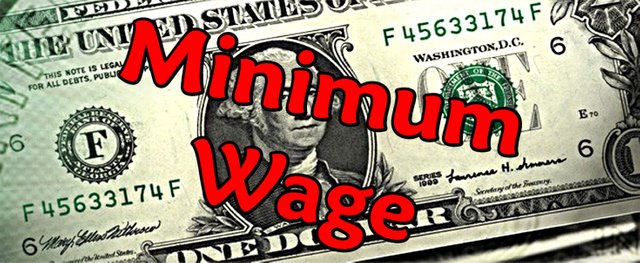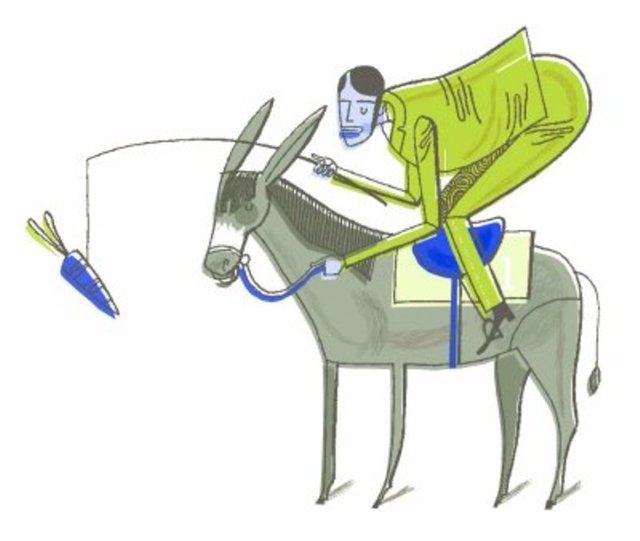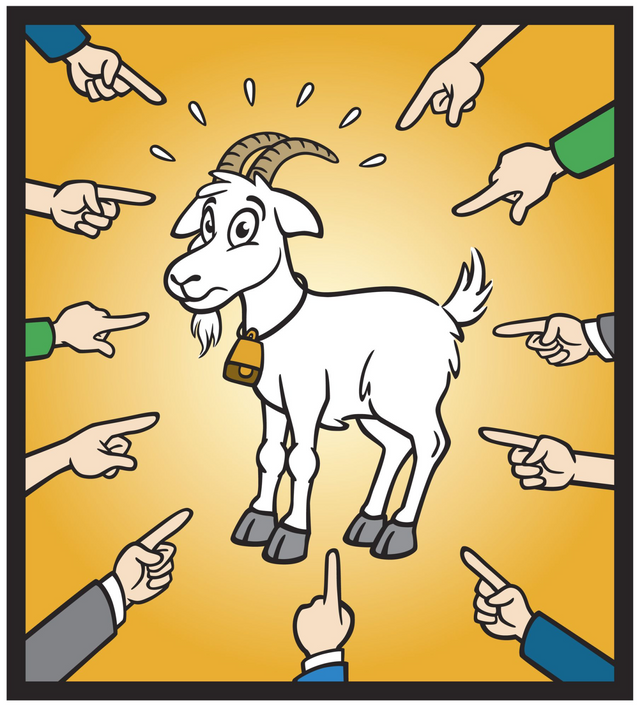Why minimum wage hurts minimum wage earners.
There's been, and still is, a lot of talking and arguing and screaming, and even a bit of throwing things at people, around the topic of minimum wage, and whether it's good or bad and should it be higher or lower or even exist at all.
For many people, it's a very emotive subject. It ties in very closely to home and family and survival, because it can directly affect a person's ability to keep and/or take care of those very important things.
But that's not the point of this post, the point of this post is, how does it hurt the low wage earners? At first glance, it seems that earning more money can only help those at the low end of the income scale.
Truthfully, minimum wages are merely the carrot at the end of the stick. It urges us forward, but in the end, we never catch the carrot. In this case, the carrot is a sustainable wage that allows people to maintain a decent standard of living.
Minimum wage is simply a tool that is used to urge the loyal steeds of the electorate ever forward, in order to keep them giving their time and energy into a system that has been constantly rigged to move money from the poor to the powerful and wealthy. And, ultimately, it ends up hurting the low wage earners infinitely more in the long term. It does this by removing entry level jobs from the market. No one wants to pay a checkout bagger the same wage as a shift manager, after all.
And, in fact, the shift managers wouldn't want to do their job if they could get the same pay for the much easier task of putting groceries into bags. Forcing stores to pay them a higher wage forces them to raise the wages of everyone in the store, in order to keep experienced employees who bring more value to the company. In order to offset this, however, they often have to consolidate positions(i.e. combine the work of two separate jobs into a single position), or eliminate them entirely(like with self checkout lines).
So, minimum wage helps give the appearance of helping low wage earners, but in the end, it makes it harder for them to find jobs in the first place. And the crazy thing is that, often, when someone's job is eliminated due to increases in the minimum wage, they often blame the employers for being 'cheap'.
Of course, many people will disagree with this, but disagree all you want. It won't change the reality of numbers and business opportunity. If you want to show compassion to the poor, if you want them to have opportunities to provide for and improve the circumstances of themselves and their families, stop regulating their jobs. Stop telling them they have to get this license and that degree and a business permit. And definitely stop telling them they can't hire people willing to work for less than whatever arbitrary amount has been decided as the 'minimum'. Simply stop making it illegal for poor people to start their own business. Barriers to entry into markets are what keeps poor people poor, not the failure to point a gun at the heads of their employers until they have to either fire them or go out of business.



I love this! I always hear stuff about "They need to raise it" etc. I think they should get rid of it all together, If they make it so an employer can pay whatever they choose. Then more people will get paid based on worth, Because someone who has a lot of experience won't work at 7.00 an hour, They'll negotiate a different pay amount. I feel like by removing it all together things will become somewhat more balanced.
I don't think we need to get rid of it. Otherwise when the job market is like this there will be those working for $2-$3/hour. I think the minimum wage should be set by the local government, even at the city level.
So then you'll simply have the local government dictating who is employable and who isn't. And watch cities with higher minimum wages die as all the jobs move to the next town over.
I didn't have time to finish the thought, but yes, that could happen. If it does then the city changes the law or dies. It should be more or less a wage that is above slave labor but below what an entry level person should receive for their work depending on the local market and cost of living.
Ideally, though what people should be asking is for the government to re-evaluate taxes, regulations (compliance), licensing, etc. that is making it more cost effective to go elsewhere. In the end we are the ones that pay, consumers and workers.
Competition isn't just good for consumers, more businesses and less unemployed means competition by companies for employees. You don't want to have a labor shortage, but right now we have an overabundance of labor looking at the BLS statistics. Younger Americans aren't entering the workforce as early and older Americans are keeping their jobs longer.
Part of the problem is that the US has shifted from a production/manufacturing based economy to a service based economy. Most services are low paying, those that aren't are being outsourced as the technology becomes available to do so.
An upcoming project I may be involved in is outsourcing labor, they can pay someone $25k to put together a software application as opposed to the $45k an individual wanted here. There is no incentive to hire someone in the US in this situation. How do we encourage companies to hire locally when someone will work cheaper in another country?
The problem isn't just about minimum wage, raising it/lowering it won't help unless other policies are re-evaluated and more jobs are created.
This is all off the top of my head.. didn't reread and edit it. Busy day but I wanted to respond. Sorry if I repeated myself anywhere or if I don't make my thoughts clear.
I've heard the argument about shifting away from production and manufacturing, and that's a red herring. The issue isn't what kind of businesses there are. The issue is that more and more, the businesses that are here are huge monolithic organizations that streamline and eliminate jobs a thousand at a time to cut costs, which is to be expected. Businesses always want to cut costs. That's a way that you make more money.
The problem is that there's not enough businesses of any type. The more businesses you have, the more jobs you're creating. The fewer regulations you have on businesses, the more businesses you'll have, and thus, the more jobs you'll have. You don't need a minimum wage to improve the standard of living, you need an environment that doesn't punch you in the face if you try to start your own business.
Yes, although simply getting rid of minimum wage won't fix the jobs issue. You need to stop requiring all the expense of the fees and the fines and the permits and licenses for new businesses. Small business are, and have always been, the largest employer. All the layers of restriction prevent them from being formed in the first place, which does nothing good for the price of labor, from the perspective of the worker.
What you said describes so well one big reason why I left the USA all those years ago.
I did not wish to become a boiled frog.
Wish it were fixable, but it ain't.
Oh, it's totally fixable. Of course, there's a possiblility that there will be times of hardship. But open your eyes and look around. People are taking the legs out from under government everywhere you look. You can buy bitcoins instead of dollars, decentralized services are popping up more and more, people are becoming more and more comfortable simply ignoring the arbitrary sharecropping rules that government has been imposing on business since government realized it could just make people give it a percentage for no apparent reason.
Things are changing. There will be rough times while people sort out a new way for things to work, but the old world is going away, one tiny little bit at a time.
let there be freedom in wage-setting!

Let there be freedom in all voluntary transactions!
You suggest that people shouldn't have to get licenses, permits, obey regulations, raising the barrier to entry to start a business, etc.
The government employes hundreds of thousands of people doing that..
What should these hundreds of thousands of people do instead?
(I'm semi-sarcastic) ... lol. Interested in your answer, and I do agree with you.
That's a fairly legitimate question. And the answer is, they'll get a job working for someone else who needs a desk jockey to push some paperwork around, or they'll get some other kind of job, or they'll start their own business since it will be much easier to do without them siccing the local enforcement on you for not making their jobs meaningful.
I mean, what if all their jobs disappeared tomorrow? Sure, there would be a time of panic and freaking out. That would be inevitable. But it would sort itself out over time. Contrary to the popularly expressed belief of politicians, people, left to their own devices, will not simply sit on the floor and starve to death. They'll find something to do to feed themselves. Many of them will probably start businesses of their own. Leave the market alone, and people will sort their shit out.
Here's a question for you. Those people are actively participating in an organized effort that makes it much more difficult for the average person, let alone a poor person, to start a business or get a good job, and thus improve their standard of living and that of their family. Should their jobs exist?